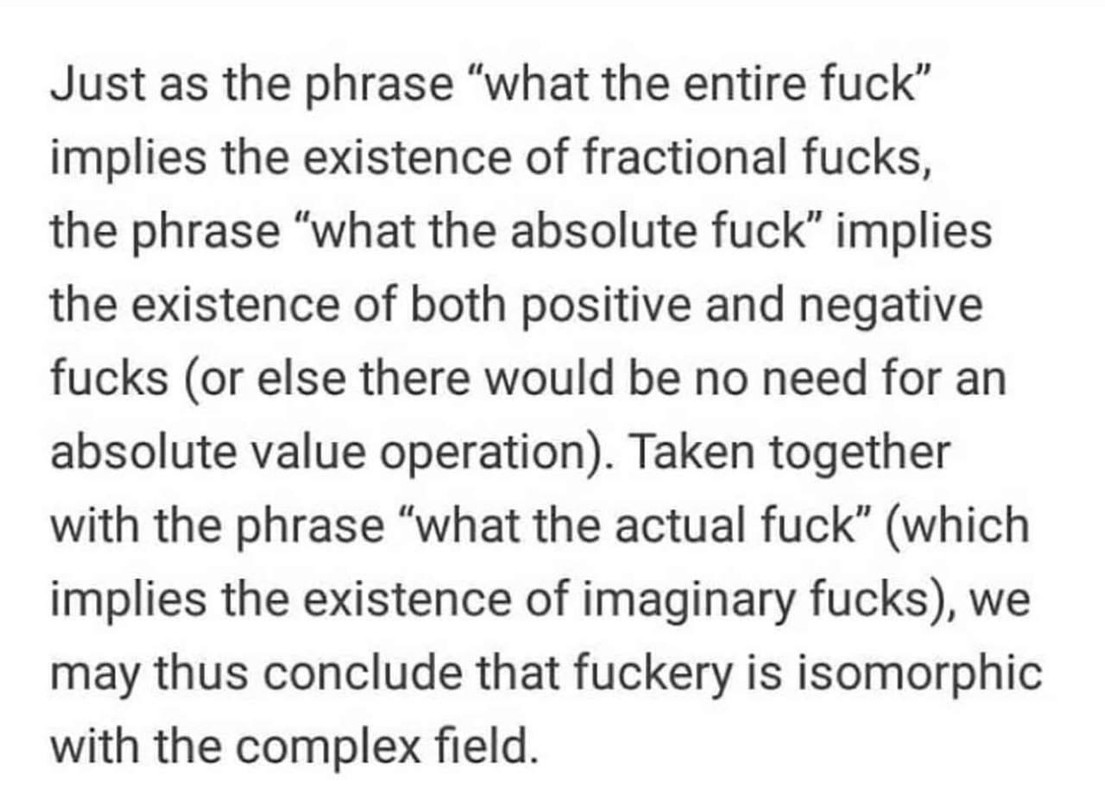underpants
underpants's JournalJohn Coltrane Draws a Picture Illustrating the Mathematics of Music
I've got to check out this site some more but I've seen two very interesting articles on it so far
http://www.openculture.com/2017/04/the-tone-circle-john-coltrane-drew-to-illustrate-the-theory-behind-his-most-famous-compositions-1967.html
Physicist and saxophonist Stephon Alexander has argued in his many public lectures and his book The Jazz of Physics that Albert Einstein and John Coltrane had quite a lot in common. Alexander in particular draws our attention to the so-called “Coltrane circle,” which resembles what any musician will recognize as the “Circle of Fifths,” but incorporates Coltrane’s own innovations. Coltrane gave the drawing to saxophonist and professor Yusef Lateef in 1967, who included it in his seminal text, Repository of Scales and Melodic Patterns. Where Lateef, as he writes in his autobiography, sees Coltrane's music as a "spiritual journey" that "embraced the concerns of a rich tradition of autophysiopsychic music," Alexander sees “the same geometric principle that motivated Einstein’s" quantum theory.
Neither description seems out of place. Musician and blogger Roel Hollander notes, “Thelonious Monk once said ‘All musicans are subconsciously mathematicians.’ Musicians like John Coltrane though have been very much aware of the mathematics of music and consciously applied it to his works.”

Coltrane was also very much aware of Einstein’s work and liked to talk about it frequently. Musican David Amram remembers the Giant Steps genius telling him he “was trying to do something like that in music.”
Hollander carefully dissects Coltrane's mathematics in two theory-heavy essays, one generally on Coltrane’s “Music & Geometry” and one specifically on his “Tone Circle.” Coltrane himself had little to say publically about the intensive theoretical work behind his most famous compositions, probably because he’d rather they speak for themselves. He preferred to express himself philosophically and mystically, drawing equally on his fascination with science and with spiritual traditions of all kinds. Coltrane’s poetic way of speaking has left his musical interpreters with a wide variety of ways to look at his Circle, as jazz musician Corey Mwamba discovered when he informally polled several other players on Facebook. Clarinetist Arun Ghosh, for example, saw in Coltrane's "mathematical principles" a "musical system that connected with The Divine." It's a system, he opined, that "feels quite Islamic to me."
The Cramps Play a Mental Hospital in Napa, California in 1978: The Punkest of Punk Concerts
20 minute video at link
http://www.openculture.com/2016/02/the-cramps-play-a-mental-hospital-in-napa-california-in-1978-the-punkest-of-punk-concerts.html
“We’re The Cramps, and we’re from New York City, and we drove 3,000 miles to play for you people.” So begins one of the oddest but also the punkest of punk rock concerts in history, as The Cramps play for a crowd at a state mental hospital in Napa, California. The date was June 13, 1978, a time when Napa was more known for the hospital than for its burgeoning wine industry.
Lead vocalist Lux Interior made this introduction after the first number, “Mystery Plane.” The band played on a patio, several steps above the courtyard at the institution, while the band's friends hung out with the 100 or so patients in attendance.
"And somebody told me you people are crazy, but I’m not so sure about that,” Lux continues in the video. “You seem to be all right to me.” Indeed, most everybody seems to be having a hell of a time, some dancing as if they're at a sock hop, others just completely thrashing about.
This wasn’t the first band to have played at the institution, as the hospital’s Bart Swain, who invited The Cramps to Napa, often brought in musicians to expand the patients’ horizons. But on that night a video camera was also brought along to record the set. (Swain worried about preserving the anonymity of the residents.)
Beware! The MEMES of March



---------

--------



Trump Stuck For Hours After Failing To Negotiate Path Around Janitor’s Bucket

(The White House) The West Wing is finally back to normal after an incident which left the President stuck on a staircase for much of the evening.
“It appears a janitor’s bucket was left out and President Trump found himself incapable of negotiating a path around it.”
“Just like then he walked right up to the bucket with no preparation or plan as to how he was going to deal with it.”
It appears to be yet another example of the self-described ‘Dealmaker in Chief’ expecting things to effortlessly go his way.
“I think he believed the bucket would cave completely and move itself out of his way.”
http://www.breakingburgh.com/trump-stuck-for-hours-after-failing-to-negotiate-path-around-janitors-bucket/
Your Library Card Can Get You So Much More Than Books (Tools, dogs, seeds, etc. )
Pretty incredible list of things now being offered at some public libraries
https://www.southernliving.com/culture/library-card-free-things
A few years ago, the Sacramento, California public library started a new service called the Library of Things where patrons could borrow books, of course, but also sewing machines, GoPro cameras, hedge trimmers, button makers, and a lot more. Patrons loved the ability to borrow things like pressure washers, projectors, and screen printers, which are useful but not necessarily something you want in the garage forever. Soon, the idea caught on nationwide.
The Arlington Public Library in Virginia loans out American Girl dolls. Georgia’s public library system offers 3D Printing, Legos, video production, robotics, and a lot more in their makerspaces. Cardholders can also use their library cards to get passes to the Atlanta Zoo, Georgia State Parks & Historic Sites, and more. You can also borrow items like sewing machines and even a green screen for film special effects.
Over in Manatee County, Florida, the library offers everything from telescopes to fishing poles to ukuleles. They also offer museum passes for any library card holders who want to visit the Gulf Coast’s South Florida Museum.
And while it’s not technically a public library, the Asheville Tool Library offers over 1,000 items, including every tool you can think of from chisels to pitchforks to chainsaws, as well as useful items like folding camp chairs and space heaters to borrow as needed.
Interesting, the propaganda machine is now it's own primary focus
Running a cult can be hard. The followers yearn for something new. Information. Word from the leader. New members. Just like anything else time management becomes difficult so distraction is used. Bread and circus. Rooting for the winning home team.
It appears that the socialism distraction is all the rage these days in Foxworld (this includes the dashboard believers - radio) but just this evening I am seeing something new. New information. A victory!
Considering Facebook representative of anything is of course foolish but if you use it to gauge what THEY are being told it is useful. I have "friends" who post political stuff on both sides. Both seem to follow the same trends, mostly the news of the last few days. The rightwing Foxworld crowd though usually moves together and it's reflected on Facebook.
Disciplined and unified in the same basic focused direction. Today there is a sudden and clear message of how Fox News is dominating ratings. Okay they have for a while. The have viewers who never see anything else AND religiously watch. The first one I saw was about how Hannity is #1. Then I saw another about how Fox News trounces the competition. Two more posts from people taking a victory lap with their news channel. Then in a discussion about the CNN special about the Bush family there were three separate comments reflecting the same points. I recognized all but one of the posters. The original posts were from "friends" I know are right wingers.
At first I thought it was odd because I've seen several news stories and posts here in DU about how Maddow is doing and how Fox got swamped during the Cohen hearing. These have been pretty consistent for the last year really. Yes Fox is still #1 but it's clearly waning.
The dashboard believers are now being told by their own machine that IT in and of itself should be the focus. Follow IT for the win. IT must be praised and celebrated. Word from the leader says there are new members! Go team IT!
Please await further instructions.
CPAC 2-fer. "One of the main themes here...that Democrats are taking about" & "election integrity"
The local RW radio station is broadcasting on site at CPAC. Morning and afternoon drive time. The morning host is John Reed - Richmond native who worked on George Allen’s Senate staff and has been around campaigns and the game for a while.
“Election integrity” is their new PC way of talking about “voter fraud”. That was in the 8:30 segment so I missed it. I must have missed this new phrase until now.
This is the one that had me cracking up:
“One of the main themes here this week is something the Democrats are talking about all across the country. They really aren’t even trying to hide it anymore....”
Gee! What ever could it be? ![]()
![]()
“Socialism”
I KNEW IT!! ![]()
He introduced his guest saying that Democrats used to use covert terms to not say socialism but now they don’t. His guest was a guy named Justin Hawkins from the Heartland Institute who has a book called “Socialism is Evil”. This guy went right into an elevator pitch - 167 million people killed by socialism in the last 100 years. That’s over 50 9/11’s! Socialism forces minorities, both religious and ideological, to succumb to the will of the majority”.
That’s all I got before the signal died in the parking garage at work.
See! It’s not THEM talking about socialism it’s THE DEMS, they are just victims succumbing to the will of the all mighty Democrats. Oh and the minorities thing ![]()
Melee at an execution. Texas style.
Death-row inmate says cryptic last words before fight breaks out at execution
Although what Coble meant by the cyptic remark was unclear, it was likely a reference to his nickname, "$5 Bill," according to the Dallas Morning News.
As Coble was finishing his statement, his son, a friend and a daughter-in-law became emotional and violent. They were yelling obscenities, throwing fists and kicking at others in the death chamber witness area.
His son, Gordon Coble, pounded on the execution chamber windows and shouted "no" as his father was executed, the Houston Chronicle reported. Another son Dalton joined his brother, the report said. Officers stepped in and say the witnesses continued to resist. They were eventually moved to a courtyard and the two men were handcuffed.
Texas Department of Criminal Justice spokesman Jeremy Desel said the two men were arrested on a charge of resisting arrest and taken to the Walker County Jail.
https://www.foxnews.com/us/texas-man-executed-for-killing-estranged-wifes-family-nearly-30-years-ago
The $10 Million comma
The $10 million comma
In this class action lawsuit, drivers for Oakhurst Dairy sued the company over its failure to grant them overtime pay. According to Maine law, workers are entitled to 1.5 times their normal pay for any hours worked over 40 per week. However, there are exemptions to this rule. Specifically, companies don’t need to pay overtime for the following activities:
The canning, processing, preserving, freezing, drying, marketing, storing, packing for shipment or distribution of:
Agricultural produce;
Meat and fish product; and
Perishable foods
Note the end of the opening line, where there is no comma before the “or.”
Oakhurst Dairy argued its drivers did not qualify for overtime because they engage in distribution, and the spirit of the law intended to list “packing for shipment” and “distribution” as two separate exempt activities.
However, the drivers argued the letter of the law said no such thing. Without that telltale Oxford comma, the law could be read to exclude only packing — whether it was packing for shipment or packing for distribution. Distribution by itself, in this case, would not be exempt.
Without that comma, as the judge maintained, this distinction was not clearcut:
Specifically, if that exemption used a serial comma to mark off the last of the activities that it lists, then the exemption would clearly encompass an activity that the drivers perform. And, in that event, the drivers would plainly fall within the exemption and thus outside the overtime law’s protection. But, as it happens, there is no serial comma to be found in the exemption’s list of activities, thus leading to this dispute over whether the drivers fall within the exemption from the overtime law or not.
As a result, the court found in favor of the drivers, costing the dairy an estimated $10 million.
https://thewritelife.com/is-the-oxford-comma-necessary/
Cohen "just a utility infielder" Former Trump aide on AC360
on edit - Michael Caputo. Rick Wilson is on too.
Profile Information
Member since: 2001Number of posts: 182,988




